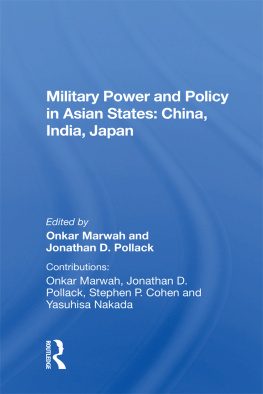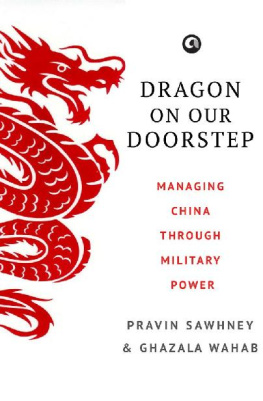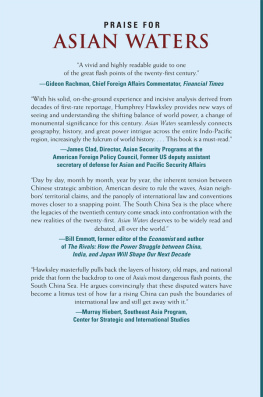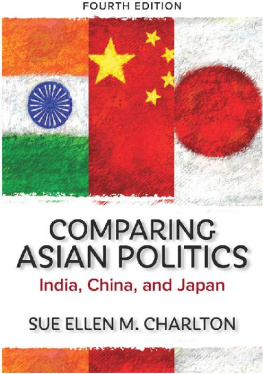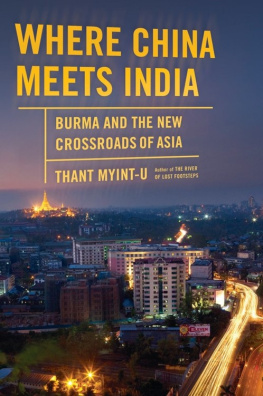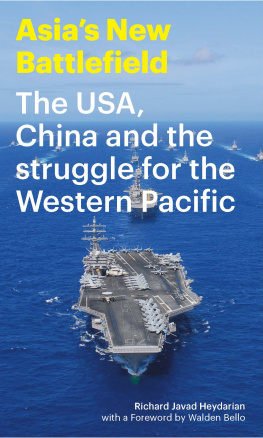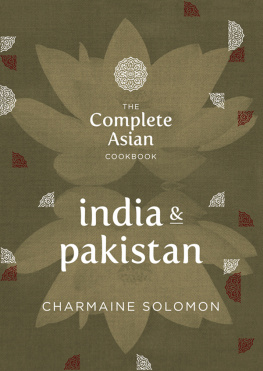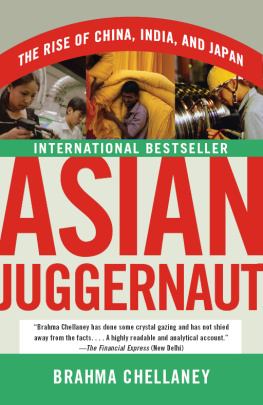Military Power and Policy in Asian States
Also of Interest
Huadong: The Story of a Chinese People's Commune, Gordon Bennett
China's Oil Future: A Case of Modest Expectations, Randall W. Hardy
A Theory of Japanese Democracy, Nobutaka Ike
Perspectives on a Changing China: Essays in Honor of Professor C. Martin Wilbur on the Occasion of His Retirement, edited by Joshua A. Fogel and William T. Rowe
Chinese Communist Power and Policy in Xinjiang, 1949-1977, Donald H. McMillen
The People's Republic of China: A Handbook, edited by Harold C. Hinton
Malaysia's Parliamentary System: Representative Politics and Policymaking in a Divided Society, Lloyd D. Musolf and J. Frederick Springer
Mongolia's Culture and Society, Sechin Jagchid and Paul Hyer
The Memoirs of Li Tsung-jen, T. K. Tong and Li Tsung-jen
About the Book and Editors
Military Power and Policy in Asian States: China, India, Japan
edited by Onkar Marwah and Jonathan D. Pollack
This study challenges the belief that the security concerns and strategic objectives of lesser states are dependent on the dominant power alliances and on assessments by major powers of the prospects for peace or war. Focusing on the views of security and military power adopted by elites in China, India, and Japan, the contributors point out that each of these states has been moving steadily toward military autonomy and away from dependence on major powers; while inhibited by the general rules of an international strategic system dominated by the two superpowers, each state has sought to further ends quite different from those assigned them by major powers. This astute description and assessment of the strategies pursued by security elites suggest strongly that future prospects for stability and peace in Asia will be increasingly determined by the states of the region themselves.
Onkar Marwah is assistant director, Program for Strategic and International Security Studies, Graduate Institute of International Studies, University of Geneva, and served for seven years with the government of India's Administrative Service. Jonathan Pollack is a member of the Social Science Department of the Rand Corporation.
Military Power and Policy in Asian States: China, India, Japan
edited by Onkar Marwah and
Jonathan D. Pollack
Contributors:
Onkar Marwah
Jonathan D. Pollack
Stephen P. Cohen
Yasuhisa Nakada
First published 1980 by Westview Press, Inc.
Published 2018 by Routledge
52 Vanderbilt Avenue, New York, NY 10017
2 Park Square, Milton Park, Abingdon, Oxon OX14 4RN
Routledge is an imprint of the Taylor & Francis Group, an informa business
Copyright 1980 Taylor & Francis
All rights reserved. No part of this book may be reprinted or reproduced or utilised in any form or by any electronic, mechanical, or other means, now known or hereafter invented, including photocopying and recording, or in any information storage or retrieval system, without permission in writing from the publishers.
Notice:
Product or corporate names may be trademarks or registered trademarks, and are used only for identification and explanation without intent to infringe.
Library of Congress Catalog Card Number: 79-16241
ISBN 13: 978-0-367-02094-1 (hbk)
To our mothers Smt. Trilochan Kaur Marwah and Esther Duker-Pollack
Contents
, Onkar Marwah and Jonathan D. Pollack
, Onkar Marwah and Jonathan D. Pollack
, Stephen P. Cohen
, Jonathan D. Pollack
, Onkar Marwah
, Yasuhisa Nakada
The need to assemble a volume on the security perspectives of Asia's major states has been apparent to both of the editors for some time. For far too long, China, India, and Japan have been viewed as states with regionally derived national security objectives and policies. In a superpower context, this judgment is no doubt correct. However, reliance on this single perspective is both limiting and shortsighted, as witness the dramatic events within Iran and between Vietnam and Cambodia without deference to superpower concerns. Indeed, the Asia of the 1970s is most assuredly not the Asia of the previous decades. This conclusion will apply with far greater force over the next ten years. A serious consideration of the independent directions and consequences of the political and military changes now underway among Asian states is thus long overdue.
However, simply to assert that Asia is changing tells us little. What we have tried to do in this collection of essays is to look at the more concrete meaning and implications of this transition and at where it is likely to lead in the coming decade. The fact that it is now possible to assemble this collection is indeed reflective of the heightened consciousness about security and military power in these societies. Such developments are unmistakably underway, and not to take stock of them seems myopic at best.
In preparing this volume, we have made no attempt to impose a coherent overall view. The differences in approach among the various authors should be readily apparent. However, all of the contributors share an overall perspective concerning the study of military power and policy. We have therefore sought whenever possible to have a common set of issues discussed by each author. Some of these broader questions are further considered in our introductory chapter and in Stephen Cohen's essay.
The immediate stimulus for this volume came from a panel we jointly organized for the eighteenth annual convention of the International Studies Association, held in St. Louis in March 1977. On the suggestion of Mervyn Adams Seldon, we recast the initial papers and presentations, and in some cases sought new contributors. Though this process has led to a delay in the volume's publication, we believe that a far stronger set of essays has been the result. Lynne Rienner of Westview Press deserves special mention for her reminders (at first gentle, but somewhat later justifiably more blunt) that delinquent editors necessarily deserve. Her forbearance, always with an appropriate measure of humor and friendliness, surpassed all reasonable limits.
We also wish to acknowledge the generous financial support without which this volume would never have appeared. The Harvard University Program (now Center) for Science and International Affairs provided a supportive intellectual environment where such collaborative work was actively encouraged and facilitated. In addition, the facilities of the Fairbank Center for East Asian Research were of considerable help to Jonathan Pollack. During the 1977-1978 academic year, both editors received fellowships from the Program in International Relations of the Rockefeller Foundation. The foundation's generous support enabled us to continue our research and complete work which would otherwise have languished.
Our dedication reflects our parallel indebtedness to our mothers. Their influence is evident not so much in our actual research, but in the personal and intellectual encouragement they have long provided. In a more immediate sense, Jonathan Pollack wants to thank both Josh and Noah, who (even if they do not yet understand publishers' deadlines) surely sensed when work had to intrude on our time together.


